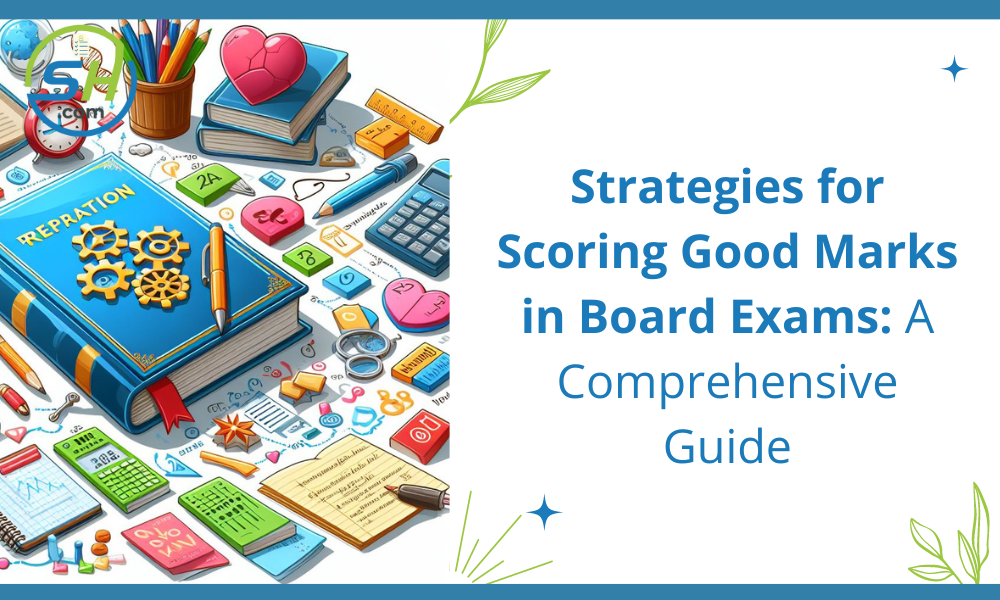
Board exams are a significant milestone in a student’s academic journey, often serving as a pivotal point that can shape future opportunities. Preparing for these exams requires dedication, planning, and effective strategies to achieve success. Scoring well in board exams is not merely about cramming information but rather about adopting smart study habits and techniques. Here’s a comprehensive guide outlining various strategies to help you score good marks in your board exams.
Understanding the Syllabus
One of the fundamental steps in preparing for board exams is understanding the syllabus thoroughly. Go through the curriculum provided by the board and create a subject-wise checklist. Having a clear idea of what topics and chapters need to be covered will guide your study plan. A thorough understanding of the syllabus forms the backbone of your preparation strategy for board exams. It empowers you to organize your study plan effectively, prioritize topics, utilize appropriate resources, track progress, and stay focused on the essential areas to maximize your chances of scoring well in the exams.
Create a Realistic Study Schedule
A well-structured study timetable is crucial. Allocate specific time slots for each subject based on their importance or your proficiency level. Ensure a balance between subjects, incorporating breaks to avoid burnout. Stick to your schedule religiously, but also be flexible to accommodate any unforeseen circumstances. a study schedule is a tool to guide your preparation, but it should also be adaptable to accommodate changes or unforeseen circumstances. Following a well-structured and realistic study schedule consistently can significantly enhance your readiness and performance in board exams.
Effective Time Management
Time management is key to success. Identify your peak productivity hours and allocate the most challenging topics during this period. Break down your study sessions into smaller, manageable tasks to enhance focus and productivity. Use tools like timers or study apps to track your progress and maintain discipline.
Utilize Quality Study Material
Gather high-quality study material like textbooks, reference books, previous year’s question papers, and online resources. Invest in reliable study guides or reference materials recommended by teachers or subject matter experts. Ensure the credibility of online resources before relying on them.
Practice Regularly
Mere reading or memorization is not sufficient. Practice is crucial for better retention and understanding. Solve sample papers, attempt mock tests, and work on previous years’ question papers to get acquainted with the exam pattern and question types. This practice will also help manage time during the actual exam.
Focus on Conceptual Understanding
Understanding concepts is more important than rote learning. Instead of just memorizing, try to comprehend the underlying principles and logic behind each topic. Engage in discussions with peers or teachers to clarify doubts and strengthen your understanding.
Revise Regularly
Revision is the key to reinforcement. Schedule regular revision sessions to go through previously covered topics. Create concise notes or flashcards summarizing important points to aid quick revision before the exams.
Healthy Lifestyle
Maintaining a healthy lifestyle is often overlooked but plays a crucial role in enhancing productivity. Ensure an adequate amount of sleep, a balanced diet, and regular exercise. Avoid stress by incorporating relaxation techniques like meditation or yoga into your routine.
Stay Calm and Confident
Exam anxiety can hinder performance. Stay calm and confident by avoiding last-minute cramming. Believe in your preparation and stay positive. Practice deep breathing or visualization techniques to stay relaxed and focused during the exam.
Seek Guidance
Don’t hesitate to seek guidance from teachers, mentors, or seniors. Discussing doubts or seeking clarification on difficult topics can significantly improve your understanding and performance. Seeking guidance isn’t a sign of weakness but a proactive approach to ensure a more thorough understanding of the material. Utilizing the expertise and support available from teachers, mentors, or seniors can significantly contribute to your success in board exams.
Simulate Exam Conditions
Practice solving papers within the stipulated time under exam conditions. This helps in improving time management and familiarizes you with the exam environment, reducing anxiety on the exam day.
Avoid Procrastination
Procrastination can be detrimental to your preparation. Identify distractions and create a conducive study environment free from interruptions. Stay away from social media or other distractions during study hours.
Stay Updated with Current Affairs
For subjects like Social Sciences, staying updated with current affairs is crucial. Read newspapers, watch the news, or follow credible online sources to stay informed about recent developments.
Post-Exam Analysis
After each mock test or practice session, analyze your performance. Identify weak areas and work on improving them. Understand your mistakes and learn from them to avoid repetition in the actual exam.
In conclusion, scoring good marks in board exams requires a holistic approach that encompasses effective time management, thorough understanding of concepts, regular practice, and a healthy lifestyle. With dedication, proper planning, and consistent effort, success in board exams is within reach. Remember, it’s not just about the marks; it’s about the knowledge gained and the skills acquired during the preparation that will benefit you in the long run. Best of luck!